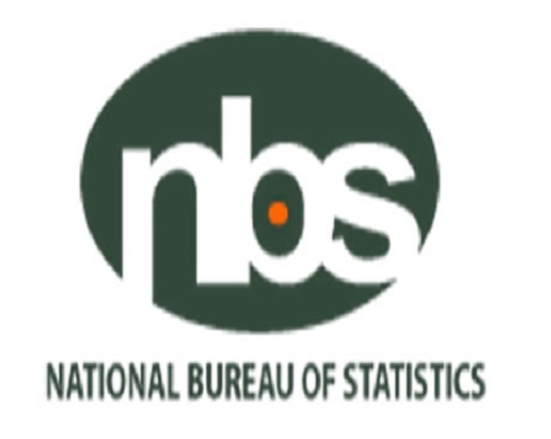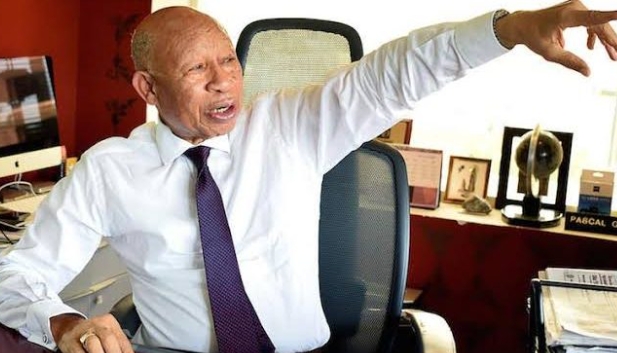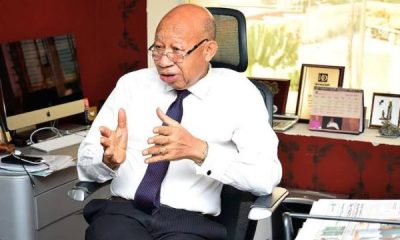News
Services, petrol refining sectors pilot GDP growth to 3.84%

By Kayode Sanni-Arewa
This is fastest growth rate in three years, says Edun
Yusuf: economy on track
Uwaleke: real sector still slow
Experts last night expressed optimism about the economy with the 3.84 per cent year-on-year Gross Domestic Product (GDP) growth.
The government also renewed its commitment to faithfully implementing its economic policies which it credited for this development.
Tuesday, the National Bureau of Statistics (NBS) released the 2024 fourth quarter GDP outcome – 3.84 per cent, compared to the 3.46 per cent of Q4 2023.
Services and petrol refining sectors were the key drivers of the growth, according to the report.
Statistician-General of the Federation, Prince Adeyemi Adeniran, said the growth was 0.38 per cent points higher than the 3.46 per cent of Q4 2023.
Adeniran said: “The Gross Domestic Product (GDP) growth rate in real terms (Constant price) grew by 3.84 per cent in the fourth quarter (Q4) of 2024 on a year-on-year basis, which is 0.38 per cent points higher than the rate recorded in Q4 2023 (3.46 per cent
“The annual contributions of the economic sector showed that agriculture contributed 24.64 per cent in 2024, which is lower compared to its contributions which stood at 25.18 per cent in 2023.
“Similarly, the industry sector’s annual contribution was 18.47 per cent, which is also lower than the figure recorded for 2023 (18.65%).
“However, the services sector contributions for 2024 were 56.89 per cent, which exceeded the 56.18 per cent recorded for 2023.
The oil GDP grew by 1.48 per cent in Q4 2024, which showed a decline compared to 12.11 per cent recorded in Q4 2023, and the previous quarter of Q3 2024 which stood at 5.17 per cent.
“The oil sector accounted for 4.60 per cent during the quarter under review.
“The annual oil GDP for 2024 grew by 5.54 per cent, which is 7.75 per cent higher than the annual GDP recorded for 2023 (-2.22 per cent). while the annual contribution of oil stood at 5.51 per cent in 2024 higher than its contribution in Q4 2023 (5.40 per cent)
The fourth quarter of 2024 recorded an average daily oil production of 1.54 million barrels per day (mbpd), lower than the daily average production of 1.56 mbpd recorded in the same quarter of 2023 by 0.03 mbpd.
“On the contrary, the fourth quarter of 2024 production volume was higher than the third quarter of 2024 (1.47 mbpd) by 0.06 mbpd.
“The non-oil sector contributes 95.40 per cent to the GDP in Q4 of 2024 in real terms.
“This shows an increase on a year-on-year basis when compared to the same period of Q4 2023 which recorded 95.30 per cent.
“Similarly, the quarter under review exceeds the 94.43 per cent recorded in Q3 2024.
“The economic performance of the non-oil sector in Q4 2024 is attributed to the growth recorded in some economic activities, including rail transport & pipelines, metal ores, financial institutions, road transport, quarrying and other minerals, and insurance,
“On an annual basis, the non-oil grew by 3.27 per cent in 2024, which is higher than the rate recorded in 2023 which stood at 3.04 per cent, while in terms of aggregate contributions, the non-oil contributed 94.49 per cent in 2024, which is lower than the 94.60 per cent reported in 2023.”
Minister of Finance and Coordinating Minister of the Economy, Mr. Wale Edun, expressed his satisfaction with the report, which indicates that the economy has achieved its fastest growth rate in three years.
In a statement for the ministry, Edun lauded the positive indicators, which he attributed to the effectiveness of President Bola Tinubu’s Renewed Hope Agenda and the resilience of the Nigerian economy.
We are pleased to see the continued growth momentum, both from a quarterly and annual standpoint.
“The expansion of the services sector and our ongoing efforts to strengthen food security through agricultural investments are yielding positive results,” the minister stated.
He assured of the government’s commitment to ensuring that economic growth translates into tangible improvements in the living standards of all Nigerians.
In pursuit of this goal, the Federal Government is actively implementing various initiatives, including the direct benefit transfer scheme aimed at providing immediate economic relief and support to the vulnerable.
News
Tinubu: Pascal Dozie’s contributions to Nigeria’s economic architecture left an enduring legacy

By Kayode Sanni-Arewa
President Bola Ahmed Tinubu extends his heartfelt condolences to the Dozie family, the business community, and all Nigerians on the passing of Chief (Dr.) Pascal Gabriel Dozie, an elder statesman, entrepreneur, and banker. He was 85.
Chief Pascal Dozie, OON, was a visionary whose contributions to Nigeria’s economic architecture left an enduring legacy.
As the founder of Diamond Bank and the pioneer Chairman of MTN Nigeria, he was at the forefront of two of the most transformative sectors in Nigeria’s development journey: banking and telecommunications.
Chief Dozie, a steadfast believer in Nigeria’s vast potential, was pivotal in shaping the financial services industry and expanding access to mobile connectivity nationwide. His influential leadership extended well beyond corporate boardrooms.
In addition to his business acumen, Chief Dozie served as a former director at the Central Bank of Nigeria, President of the Nigerian Stock Exchange, and Chairman of the Nigerian Economic Summit Group, dedicating decades of service to national policy formulation, private sector development, and youth empowerment.
President Tinubu lauds Chief Dozie as “a rare breed business leader whose wisdom, humility, and pioneering efforts laid a foundation upon which many continue to build. His passing is a profound loss to the private sector and Nigeria.”
The President prays for the peaceful repose of Chief Dozie’s soul and extends his condolences to his wife, children, and extended family. He calls upon the Nigerian private sector to honour Chief Dozie’s memory by upholding the values of integrity, innovation, and nation-building, for which he was renowned.
*Bayo Onanuga
Special Adviser to the President
(Information & Strategy)
News
TRADE WAR! U.S. angry over Nigeria’s import ban on 25 products

By Kayode Sanni-Arewa
The country’s reaction comes at a time when tensions are rising over its sweeping tariffs imposed on several countries.
Nigeria’s import ban on 25 different product categories impacts U.S. exporters, particularly in agriculture, pharmaceuticals, beverages, and consumer goods, the United States Trade Representative said in a statement on Monday.
According to the statement posted on its X platform, Nigeria’s restrictions on items like beef, pork, poultry, fruit juices, medicaments, and spirits limit U.S. market access and reduce export opportunities.
“These policies create significant trade barriers that lead to lost revenue for U.S. businesses looking to expand in the Nigerian market.
The country’s reaction comes at a time when tensions are rising over its sweeping tariffs imposed on several countries.
Last week, the Trump administration imposed various tariffs ranging between 10 per cent and 65 per cent on different countries across the world, including Nigeria which got a 14 per cent tariff on its exports to the United States.
Nigerian stocks on Monday recorded their biggest drop in recent times following the impact of U.S President Donald Trump’s tariffs on global trade markets.
Investors lost about N659 billion at the close of trading after the Nigerian Exchange’s All Share Index (ASI) decreased by 1.23 percent, its biggest single-day decline this month.
Stocks like Oando and Honeywell Flour Mills helped to push the market lower. Oando decreased the most, from N42 to N37.80, down by N4.20 or 10 percent, while Honeywell dropped from N11.32 to N10.19, losing N1.13 or 9.98 percent.
The Nigerian Exchange Limited (NGX) All-Share Index (ASI) and equities market capitalisation decreased from the preceding day’s 105,511.89 points and N66.147 trillion, respectively, to 104,216.87 points and N65.488 billion. The Nigerian market’s return this year has decreased to +1.25 percent.
Countries such as China have since said they would retaliate from the imposed tariffs.
China vowed on Tuesday to “fight to the end” against fresh tariffs of 50 percent threatened by US President Donald Trump, further aggravating a trade war that has already wiped trillions off global markets.
The Minister of Finance, Wale Edun, on Monday said that the Federal Government will boost non-revenue as a means of cushioning the adverse effects to trade tariffs imposed on countries by President Trump.
Edun also assured that the Economic Management Team (EMT) will meet to assess the likely impact of the 14 per cent tariff on goods exported from Nigeria to the United States.
He said the EMT will afterwards, make recommendations to cushion its impact on the nation’s economy.
Edun, who was speaking at an event organised by the Ministry of Finance Incorporated on Monday, said that while the adverse effect on Nigeria will be through an oil price plunge, the government is intensifying efforts to ramp up oil production and boost non-oil revenues.
News
INTERVIEW: Introduction of Child Rights Curriculum In Nigerian Universities Will Take CRA to Families – Dr Obiorah Edogor

…says implementation of CRA in Nig is far below average
Dr. Obiorah Edogor, is a Mass Communication lecturer at the Nnamdi Azikiwe University, Awka Anambra State and Child Rights Advocate, in this chat with Naijablitznews.com Associate Editor, Gloria Ikibah, he spoke extensively on why the university domesticated Child Rights Reporting into its journalism curriculum and the general studies course as UNICEF worked with the National Universities Commission (NUC) and the National Board for Technical Education (NBTE) to include the course in all of the unbundled Mass Communication courses, called JMS Journalism and Media Studies 403” and that the course would empower journalists-in-training with the capacity and understanding of the issues around child rights and how to report them.
Hear him:
What do you mean by child right curriculum?
Child rights curriculum is the outlined educational programmes which are to guide the teaching and learning of everything approved to be taught concerning the natural entitlements and privileges that every child should have or enjoy as a human being.
Why did you introduce it in the university system, one would have thought it will be in secondary school?
I feel that it was introduced in the university system as the best place where those who would learn it could easily put it into practice. The lecturers could research different dimensions of it, and the university students with their level of maturity would be guided by it.
The students could also take the messages back to their homes more than the secondary school students. However, it is not out of place to have it in secondary schools, too.
Of what benefits is this curriculum to the achievements of the implementation of the Child Rights Act?
The curriculum will be useful towards achievements of the implementation of the Child’s Rights Act 2003 because it is the easiest way to teach the students about the contents of the CRA of Nigeria. It is a way of making students have knowledge of their rights and responsibilities as provided in the CRA 2003.
How will you score the implementation of the Act in Nigeria?
I will score the implementation of the Act in Nigeria very poor because of the different concerned individuals and the relevant government agents’ lackadaisical attitude toward practical protection of the rights of the child in many angles.
How many universities have introduced the child rights curriculum?
I don’t have the exact number of universities that have introduced the child rights curriculum in Nigeria, but I say that every department of Mass Communication in Nigeria is expected to have introduced from 2019, because it was part of the Benchmark Minimum Academic Standard which all mass communication stakeholders including lecturers selected from different universities, representatives of different communication regulatory bodies and relevant international organisations prepared for teaching undergraduate programmes of mass communication as directed by the National Universities Commission (NUC).
However, I must emphasise that Nnamdi Azikiwe University is one Nigerian university that has done exceptionally well with regard to the implementation of child rights reporting and education curriculum. The university Senate has approved introduction of child rights courses in the General Studies Unit, faculties of education, law, and the social sciences. That’s why I facilitated UNICEF partnership with the university to train the lecturers who would teach the newly introduced courses in the university.
FIRST PUBLISHED ON July 23, 2023.
-

 News6 hours ago
News6 hours agoJust in: Founder of Diamond Bank and ex-chairman of MTN, Paschal Dozie is dead
-

 News13 hours ago
News13 hours agoRainfall washes away newly constructed multi-million naira road in Edo State
-

 News13 hours ago
News13 hours agoEvangelist Kekere Jesu buried amidst deep sorrow
-

 Metro13 hours ago
Metro13 hours agoStray bullet from VIP convoy kills bystander in Abuja
-

 Sports6 hours ago
Sports6 hours agoReal Madrid keeping tabs on Victor Osimhen
-

 News7 hours ago
News7 hours agoNaira Nosedives Against Dollar
-

 News24 hours ago
News24 hours agoVerbatim Magazine Honours Prof Nnamchi For Legislative Excellence, Quality Leadership
-

 News12 hours ago
News12 hours agoLG autonomy: Govs block council chairmen from opening CBN accounts


















